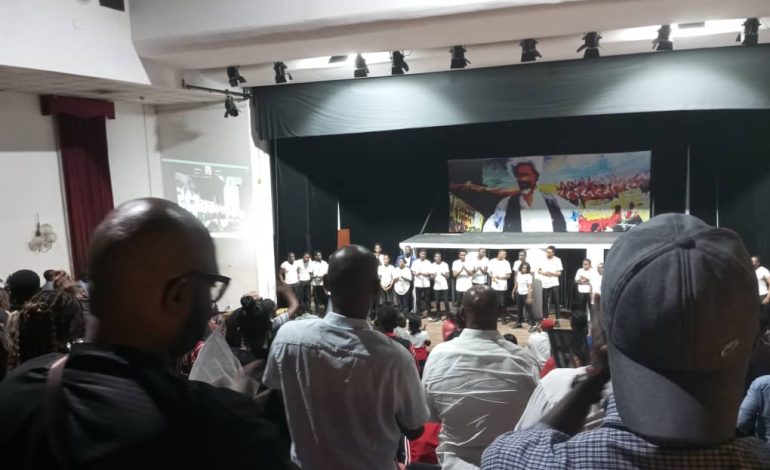The road towards a darkling plain and a poet’s renegotiation of peace

By Ajedoyin Olojede
“The true revolutionary is guided by a great feeling of love. It is impossible to think of a genuine revolutionary lacking this quality.” — Che Guevara
KEN Saro-Wiwa’s life, ending in 1995, on the other end of a noose, exemplified what it meant for a man to love his home, perhaps, far more than himself. For indeed, Saro-Wiwa could have left home to flourish someplace else, in more saner climes, away from the backdrop of coups and wars and bloodshed and oil on stagnant water. On a Darkling Plain: An Account of the Nigerian Civil War (Saros International Publishers, Port Harcourt; 1989) tells the story of the brave, often naive, ever-committed Bonny Administrator who stayed, despite all odds, to ensure his people saw the rise of a new dispensation. In the book, Saro-Wiwa tells us, in no uncertain terms, that we can never leave home because home lives in all of us. And sometimes, home can be a thorn in the flesh, but in the end, it remains what it is: home. Saro-Wiwa fails to tell us the last part, and we do not see the climax of the entire frame, but it is there in vivid colours: if we wait a bit more, sometimes home may be the end of us. Nigeria as home is the one collective metric of our consciousness.
Still, there have been differing opinions of Saro-Wiwa, some of which lay hold on his intent. In a Washington Post interview, Toyin Falola and Roy Doron argued that Saro-Wiwa’s intentions were not as selfless as he made them seem. They affirm that, “Though he claimed to have been against Biafra from the outset, his actions in the buildup to the war show us that he was more ambivalent, and that perhaps he was waiting to see how the situation would unfold before making his choice.” The events described in On a Darkling Plain give enough suggestions as to where to place Saro-Wiwa’s intentions and motives in the midst of the war. To the greatest extent, thankfully, Saro-Wiwa makes his position clear.
This month, twenty-eight years ago, there proceeded a dark and tumultuous trial. The Ogoni Nine, including Saro-Wiwa, the leader, most popular and vocal of the group, was charged for the murder of five Ogoni chiefs. But the tragedy lay more above the surface than beneath. The Ogoni Nine were lice, as it were, in the scalp of the military head-of-state, the dictator, Sani Abacha. They had to be removed, or else the state stood the risk of nursing another tribal rebellion. On November 10th, the nine men were hanged to their death, ending a phase in activism against the federal government’s, as well as the oil companies’ destruction of the Ogoni area through gas flares and oil spills.

Ajedoyin Olojede
Saro-Wiwa, poet, television producer, novelist and administrator, through On a Darkling Plain, revisits history. He goes back to the beginning, the toddler age of the seven-headed monster whose closing mission it would be to murder him. But at that point in 1989 when the book was published, and in 1966 when the story begins, Saro-Wiwa was simply panning his camera back across time to show us from whence we came as a people. He tells his story in such compact and beautiful prose that it is sometimes hard to imagine one is reading a largely historical text.
The very first creative signpost in Ken Saro-Wiwa’s memoir is his admirable manipulation of language. The work begins with a description of the ancient town of Ibadan where Saro-Wiwa lived close to the time of the first coup in January 1966. The pictures he paints of Ibadan and the events leading up to the revolution are piercing. But it doesn’t go so far than that. What we encounter going forward is a plundering into deep, cathartic, rich history of what would become an over two-decade-long military “occupation” of the Nigerian state. Saro-Wiwa’s controlled use of contrived poetry (and actual bits of his poems) in snatches across the work is a feature not seen in many of the best Nigerian Civil War memoirs I have read (at least those that have come clean as memoirs and not as fictional, imaginative pieces). His style is far from distracting in reality. Rather, they seem to bump the overall aesthetics and message of the memoir.
Published nineteen years after the end of the gruesome Nigeria-Biafra War, On a Darkling Plain performs the simple role of being a historical text, and at best Saro-Wiwa’s presentation of the dastardly acts done to the people of Ogoni who suffer, up till today, from the desecration of their waterways and lands by oil exploration and exploitation. Saro-Wiwa’s case is important to note. As a member of a minority region in the South-East, with the Igbos being the apex region or tribe, he suffers more from the marginalisation of his people and their land, even lesser than the dystopia from living in a home that has been paraded as useful only for its oil. The result of this dystopia is a startling ennui, a disillusionment that is reflected in the people’s fight for what they deserve.
From Saro-Wiwa’s deliberate misspelling of “Igbo” as “Ibo” in the book, to his decapitalisation of “Biafra,” a traditional proper noun, it is easy to imagine Saro-Wiwa shows a resentment towards Igbos as a people. And he doesn’t make it any easier to refute this argument. Saro-Wiwa bears a distaste for the “take all” mentality he observes the Igbos as having whereby they reserve the best or all of the resources in the southeast for themselves, at the detriment of the minority groups in the region who are left little or nothing. His statement close to the end of the book makes the best effort to clear this doubt. In Chapter 20 titled “Obasanjo’s Command,” after the Executive Council Chambers meeting with Dr. Nnamdi Azikiwe which held in Port-Harcourt and following Azikiwe’s speech, Saro-Wiwa confessed that, “it was the first and only time I have heard an Ibo leader accept that the Ibos had harmed their neighbours” (pg. 219). And although Saro-Wiwa had made references throughout the book to his feelings of exhaustion and frustration at the seeming inability of the Igbos to be less selfish, at this point in the book, he comes full circle, succumbing to all his deep emotions, to reveal that his problem with the Igbos is not in their seeming recklessness but in their usurpation of the resources that belong to his people, the Ogonis. Here was a man who only wanted his people to get what they deserved.
The stories Saro-Wiwa tells in On a Darkling Plain are graphic and almost picturesque. Through his rare tell-all work of journalism, we are afforded a rare chance to stare into the abysmal annals. He notes that, “An estimated one hundred thousand Rivers people died in the Nigerian Civil War – a war which they had neither wanted nor supported” (pg. 237). And these pictures aren’t necessarily pleasurable to see. They haunt and ask questions. They are ghosts calling back from decades of yore seeking answers.
Saro-Wiwa excels in his objectivity. He beats both sides of the divide with equal force, while maintaining what I may refer to as his efforts at quasi-neutrality. He straddles the middle belt of history and advocates for the rights of the Ogoni to derive the benefits accruing to them. But he isn’t merely a spectator in history. Functioning as Bonny Administrator during the Civil War, he instrumented the continuing of education that had stopped in the region due to the war, as well as the provision of food from Lagos. His camp is explicitly stated in the book. He doesn’t support the secession by the “rebel leader,” Chukwuemeka Ojukwu, nor is he particularly fond of the bearded soldier whom he regards as dishonorable and cowardly. He neither supports Yakubu Gowon’s crass wastefulness of the country’s resources post-war, and his inability to handle the civil service, some of the factors that led to Gowon’s eventual ousting in 1975.
Saro-Wiwa supplies to the vast future of Nigeria’s leaders a veritable blueprint to follow. In On a Darkling Plain, Saro-Wiwa re-educates us all on the understanding of historical patterns, as well as archetypes. Herein is a Nigeria told from the lenses of cold, hard truth. Alas, there is an urgency at the end of the work. Tenses morph to the present. Saro-Wiwa tells us without telling us. He is leaving. Time is running out, and he must end his telling. “History,” he intones at the tail end, “repeats itself.”
* Olojede, a student of English Literature at the University of Ibadan, is winner of Ken Saro-Wiwa Book Review Prize 2023



